What Is Spirulina?
Spirulina is a biomass of blue-green algae (cyanobacteria) that can be consumed by both humans and animals. There are two species of Spirulina, namely Arthrospira platensis and A. maxima.
Arthospira is cultivated worldwide and used as a whole food or dietary supplement. Spirulina is known to strengthen the immune system and provide the human body with all the proteins it can’t produce by itself.
Benefits of Spirulina:
Spirulina is a highly beneficial supplement and can be consumed for a variety of reasons, some of which are listed below.
High Nutritional Values
Spirulina has a high concentration of vitamins and proteins. A few grams of Spirulina taken daily could help your body gain all the right nutrients it requires to stay healthy and fit.
Spirulina contains high amounts of
Protein in spirulina
Spirulina is considered to be a complete source of Protein, i.e. it contains all the proteins that our body needs but is unable to produce by itself. The protein in Spirulina has a net protein utilization rate of 50% to 60%
A spoonful of Spirulina contains approximately 4 to 5 grams of Proteins.
Iron in spirulina
Spirulina is a favorite among vegans and vegetarians because it provides high amounts of iron. And unlike the iron derived from meat, it is easier to digest the iron that comes from Spirulina.
A spoonful of Spirulina contains 11% of the RDA of Iron.
Vitamin B1 in spirulina
Vitamin B1 is essential for the digestion of fats and proteins. It is also taken for improvement in eye health, increased energy, brain health and for improving nerve functioning.
A spoonful of Spirulina contains 11% of the RDA of Vitamin B1.
Spirulina is also a good source of
Vitamin B2 (riboflavin), Vitamin B3 (nicotinamide), Vitamin B6 (pyridoxine), Vitamin B9 (folic acid), Vitamin A, Vitamin C, Vitamin D, and Vitamin E. It is also a source of copper, calcium, chromium, potassium, magnesium, selenium, sodium and zinc.
Powerful Antioxidant Qualities
Spirulina is a fantastic source of antioxidants. It can protect you against oxidative damage. Oxidative damage can harm your DNA and even lead to Cancer.
The main active component in Spirulina, Phycocyanin, has powerful antioxidant and anti-inflammatory properties.
Has Anti-Cancer Properties
Research in animals suggests that Spirulina can reduce tumor size and the occurrence of cancer. Spirulina’s effects on oral cancer have been well studied.
A study with 87 Indians with precancerous lesions showed that those who took 1 gram of Spirulina per day for a year showed 45% improvement, while those who did not take Spirulina showed only 7% improvement.
Endurance and Muscle benefits
Spirulina is known to increase the burning of fats during exercises. It also helps in gaining muscles and helps avoid fatigue. Its high antioxidant properties reduce exercise-induced oxidation which leads to muscle fatigue and inability to gain weight.
Protects Bad LDL Cholesterol From Oxidation and Lowers Its Levels
Fatty structures in your body can lead to oxidation. This oxidation can be the reason for various diseases, including heart diseases. The anti-oxidants in Spirulina are extremely effective at reducing lipid peroxidation in both humans and animals.
It is also believed that Spirulina can lower the bad LDL Cholesterol levels and increase the good HDL Cholesterol levels.
May Reduce Blood Pressure
High blood pressure is the reason behind many diseases, including heart strokes, attacks, and kidney illness.
It is believed that high doses of Spirulina lead to a decrease in blood pressure. Spirulina produces nitric oxide, which helps dilate and relax the blood vessels, thereby decreasing blood pressure.
May Be Effective Against Anemia
The most common form of Anemia is the one where there’s a reduction of hemoglobin or red blood cells in your blood.
A study showed that consumption of Spirulina led to an increase in the red blood cells count and also improved the immunity of the patients. Though more research needs to be done on this front.
Side Effects of Spirulina
Even though Spirulina is beneficial for a lot of people, as with everything else, it too has a few side effects. Contaminated or low-quality Spirulina can lead to a variety of side effects, including:
- Nausea.
- Stomach cramps.
- Thirst.
- Shock.
- Weakness.
- Kidney stones.
- Insomnia.
- Liver damage.
- Rapid heartbeat.
- Headaches.
- Allergic reactions.
- Muscle Pain.
- Sweating.
An adverse case can even lead to death. Therefore, it is necessary to refer to a doctor before consuming Spirulina.
Spirulina: Dangers and Warnings
Spirulina is a great source of Proteins and Minerals, but it is necessary to be careful about the dangers that it may pose on the consumer. While choosing the brand, you should be careful and well researched. Some brands of Spirulina contain high amounts of heavy metals, making them dangerous for consumption.
Pregnant and Nursing women are also warned against consuming Spirulina since some of the vitamins in Spirulina might harm the child. You should also keep in mind the fact that you should only consume Spirulina after your doctor has given you an affirmation.
Best Spirulina Products:
Below are some of the best Spirulina Supplements available online. All of these supplements are organic and recommendable:
Spirulina Tablets:
Tablets are easy to consume, easy to carry. For people who don’t have time to make elaborate recipes and dishes, Tablets are the perfect way to consume Spirulina.
Below are some tablets that you can check out:
Triquerta Health Organic Spirulina
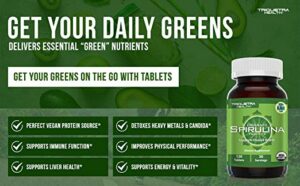
BioOptimal Organic Spirulina
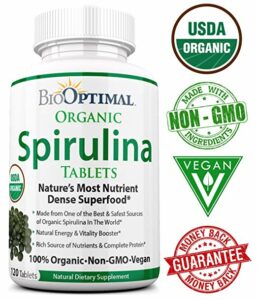
Raw Power Spirulina Tablets
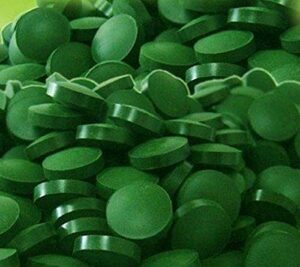
Spirulina Powder:
For those who would prefer consuming Spirulina with a drink or in a drink, the powdered form would be a good way to go. Powdered Spirulina is easy to add to whatever drink or food you may make.
Here are a few Spirulina powder recommendations:
NuSci Spirulina Powder
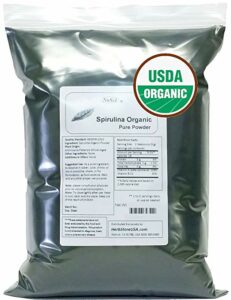
Dual Health Organic Spirulina
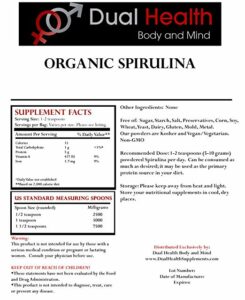
Nutrex Hawaiian Spirulina
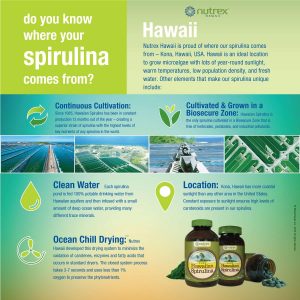
Thus, there are a number of ways in which Spirulina can be consumed. Spirulina is an enriching supplement, and if taken correctly, can benefit you in many ways. The only thing you need to remember is to consult your doctor before you start consuming a Spirulina supplement.
You may also like:
Contents
- 1 What Is Spirulina?
- 2 Benefits of Spirulina:
- 3 Spirulina contains high amounts of
- 3.1 Protein in spirulina
- 3.2 Iron in spirulina
- 3.3 Vitamin B1 in spirulina
- 3.4 Spirulina is also a good source of
- 3.5 Powerful Antioxidant Qualities
- 3.6 Has Anti-Cancer Properties
- 3.7 Endurance and Muscle benefits
- 3.8 Protects Bad LDL Cholesterol From Oxidation and Lowers Its Levels
- 3.9 May Reduce Blood Pressure
- 3.10 May Be Effective Against Anemia
- 4 Side Effects of Spirulina
- 5 Best Spirulina Products:

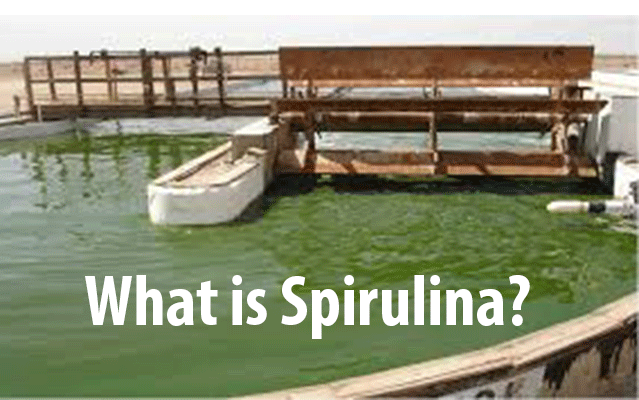
Thank you for this information. I recently purchase a container of Organic Spirulina Powder but since has seen some frightening information and warnings about ingesting Spirulina. I did use it back in the 80’s with no bad effects, but perhaps now with a bigger consumption, it’s gotten sloppier in the being careful growing department.
You say purchasing from a company that offers good quality but how on earth do we know which companies those are? At this point, I’m not going to open this container up unless I do more research that gives me confidence again.
Thank you
There are several places where you can check out the supplement. Here they are;
U.S. Pharmacopeia (USP), ConsumerLab, and NSF International
Some genuinely nice stuff on this internet site, I like it.
Very interesting subject , thankyou for putting up.